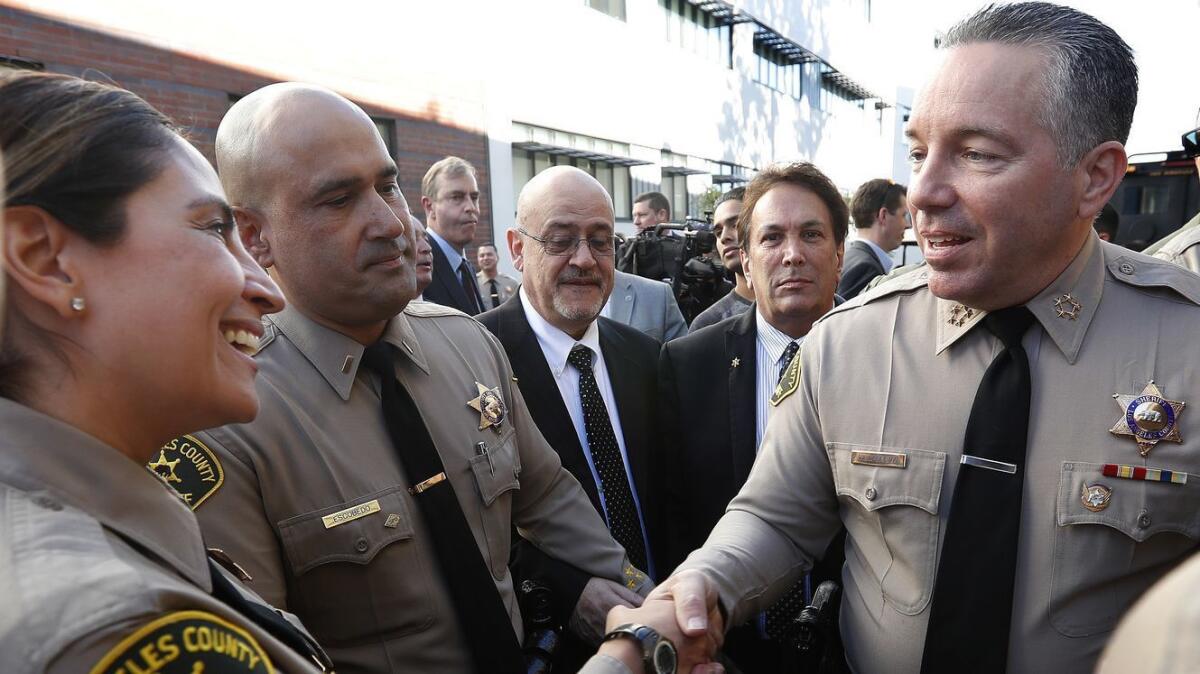Editorial: Sheriffs should not be elected

- Share via
Like most law enforcement agencies, the Los Angeles County Sheriff’s Department is a paramilitary organization whose members wear uniforms, carry weapons, are organized into a ranked command structure and are deployed in tense and often life-threatening situations requiring specialized training, presence of mind and obedience to orders. Deputies ultimately report to the sheriff — an elected official who works under no meaningful public oversight aside from standing for reelection every four years.
Such an arrangement would be unthinkable for an actual military organization. The people do not elect their generals or admirals and then leave them without further oversight. That would be the stuff of imperial Rome or Shakespearean tragedy. In a democracy, the people elect the civilian commander in chief, who in the U.S. picks a civilian Defense secretary to direct military matters. And the people elect representatives to Congress to fund or defund their armed forces.
This structure and these relationships are essential to liberty: Troops and their leaders are constantly accountable to civilians. Military expertise is balanced by civilian leadership that keeps the generals under its oversight.
The comparison of law enforcement with armies and navies may be imperfect, but for one purpose it is close enough: Sheriffs must be meaningfully accountable to civilian oversight and direction.
Yet they are not. Between elections, they are checked by, balanced by and accountable to no one. That makes them unlike city police chiefs, and more like generals.
The L.A. County Board of Supervisors on Tuesday is expected to ask its lawyers how to remove a sheriff and whether the position should be appointed. Members want to know what legal changes would be needed and how long they might take to accomplish.
They are the right questions, although the supervisors already know most of the answers.
A sheriff can be recalled by voter petition and election. A sheriff can be removed under Government Code Sec. 3060 for willful or corrupt misconduct, in a process that begins with an accusation filed with the grand jury and ends up in a court trial (the Board of Supervisors successfully removed Sheriff John C. Cline that way, 99 years ago). The supervisors could ask voters to approve a charter amendment authorizing the board to remove the sheriff for cause in a process similar to one adopted by San Bernardino County — although they may also need to seek an amendment to the state Constitution to make the process work.
Or they could try to turn the office into an appointed one. That, too, would likely require a constitutional amendment and would require years to bring to fruition.
The supervisors are asking these questions because their patience has been exhausted by Sheriff Alex Villanueva, who has resisted the layers of civilian oversight imposed on him by both the board and the voters.
There are reasons enough to want Villanueva out of office. They have been spelled out numerous times and need not be repeated here. The Civilian Oversight Commission and two supervisors have called on him to resign. We can be fairly certain of two things: He won’t, and even if he were removed from office — whether by grand jury accusation, a recall, “impeachment” by the board or defeat at the polls in 2022 — it wouldn’t solve the larger problem posed by a system of electing sheriffs that undermines accountability.
And if a sheriff is to be appointed, then by whom? Should a sheriff serve merely at the pleasure of the Board of Supervisors, subject to dismissal at any moment? Or should a person in that position have some limited measure of autonomy, like the L.A. police chief, who is appointed for a set term, is eligible for a second term, and is subject to a carefully crafted oversight system that provides limited and mutually balanced roles to the mayor, the Police Commission and the City Council? And how would that work at the county, where there is no mayor?
Those are important but secondary questions. The immediate issue is this: In Los Angeles County, the largest local jurisdiction in the nation, no sheriff should be elected. It’s time to face that essential truth and map out the long, contentious but necessary path to bring about that change.
More to Read
A cure for the common opinion
Get thought-provoking perspectives with our weekly newsletter.
You may occasionally receive promotional content from the Los Angeles Times.










